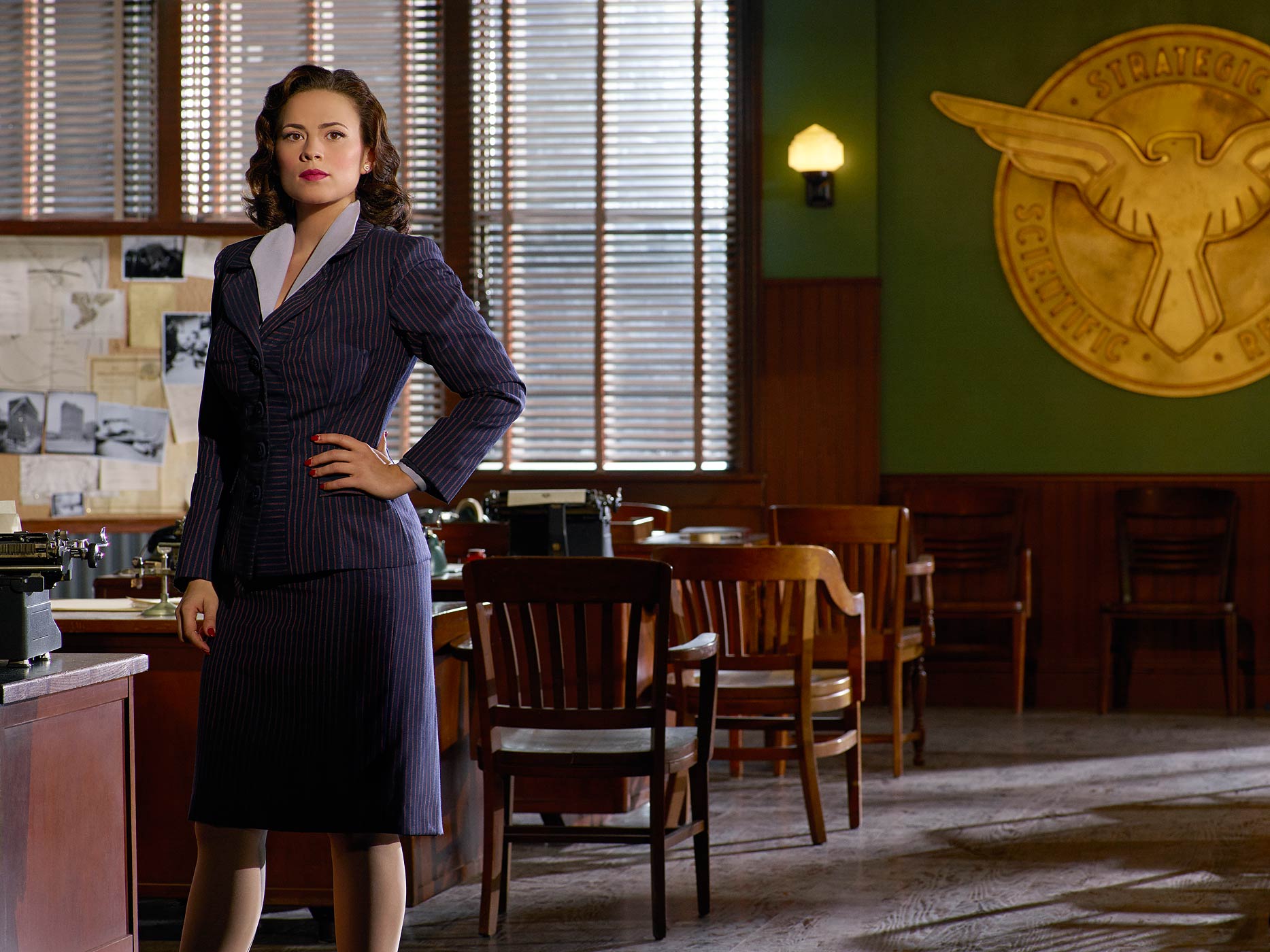
In the Marvel universe Peggy Carter, known as Captain America’s love interest and founder of S.H.I.E.L.D., is a pioneer. The creators of Agent Carter, the eight-episode series premiering on ABC Tuesday night, hope Peggy will be a different type of trailblazer.
Agent Carter is the first of Marvel Studios’ properties to feature woman as its hero. Though Marvel has announced two upcoming female-centric projects—Netflix’s A.K.A. Jessica Jones, which airs later this year, and a Captain Marvel film for 2017—Agent Carter will be a litmus test as to whether Avengers fans will tune in to see a female superhero in primetime. And as if that weren’t enough pressure, creators Tara Butters and Michele Fazekas (Law & Order: SVU, Reaper and Resurrection) were also tasked with making a compelling 1940s period thriller — for television.
“We’re trying to please many people,” Butters tells TIME. “But first we wanted to make a show that we would want to watch ourselves.”
Agent Carter begins shortly after the film Captain America: The First Avenger ends. Cap is presumed dead, the Nazi initiative HYRDRA has (allegedly) been defeated and Peggy Carter (British actress Hayley Atwell reprises her role from the Captain America films) has returned to her desk job at top secret government agency SSR. There, Carter has to deal with institutionalized sexism from men who treat her as a glorified secretary.
“She is undervalued coming off the war,” says Butters. “We looked back at the female code breakers that were used at Bletchley Park who were given these positions that were considered ‘men’s work’ during the war, and then when the war was over, they were asked to go home.” Both Carter and her roommate struggle with how to direct their exceptional talents when they’re expected to simply marry and have children.
Butters and Fazekus signed on to do a Marvel show for ABC before they even knew Peggy Carter would be the central character. They were thrilled to find out they were helming the first female-driven Marvel project, but knew they had to be careful in how they handled the period’s sexism. “As much as it’s all very time-appropriate, it would kind of grate on you if every week you saw these men not realizing Peggy’s potential. You definitely see her prove herself to these people and see her relationship with each and every man change and grow in different ways.”
Stuck as a pencil pusher, Carter jumps at the chance to help exonerate her former colleague Howard Stark (Dominic Cooper) when he winds up on SSR’s most-wanted list after his dangerous weapons technology surfaces on the black market. Carter becomes a double-agent working with Stark’s butler, Edwin Jarvis (James D’Arcy).
Carter quickly learns to use the sexism she faces as just another tool in her arsenal. “Her superpower is that people underestimate her, and she uses that to her advantage,” says Butters. “People think it doesn’t matter what you say in front of her because she’s just a girl, and as much as that may rankle her, she uses it to come out on top.”
Butters and Fazekus drew from a wide range of inspirations, including the Indiana Jones movie Raiders of the Lost Ark, which, like the first Captain America film, featured scientific-minded Nazis. Bloggers are also comparing the show’s concept to J.J. Abrams’ Alias in that they both center on female double agents. “J.J. Abrams did a wonderful job creating a smart female character who could kick butt in Alias, and I absolutely used that as a touchstone,” Butters says. “Where we differ is that Agent Carter isn’t as formulaic. You don’t see her in a different wig every week.”
Whether this plot will appeal to Marvel diehard fans has yet to be seen. “The first female-driven project for Marvel is a period piece, and some Marvel fans might assume that’s not something they’d be interested in. But we were very careful with our dialogue to not make it too period and not make it too modern,” she says. “You can watch the show not having seen any of the Captain America movies and still enjoy the character. That being said, if you are someone who watches everything Marvel, like I do, there are things we’ve laid out in these episodes that play out in the larger Marvel Universe, and you’ll be able to make those connections.”
More Must-Reads From TIME
- The 100 Most Influential People of 2024
- Coco Gauff Is Playing for Herself Now
- Scenes From Pro-Palestinian Encampments Across U.S. Universities
- 6 Compliments That Land Every Time
- If You're Dating Right Now , You're Brave: Column
- The AI That Could Heal a Divided Internet
- Fallout Is a Brilliant Model for the Future of Video Game Adaptations
- Want Weekly Recs on What to Watch, Read, and More? Sign Up for Worth Your Time
Write to Eliana Dockterman at eliana.dockterman@time.com